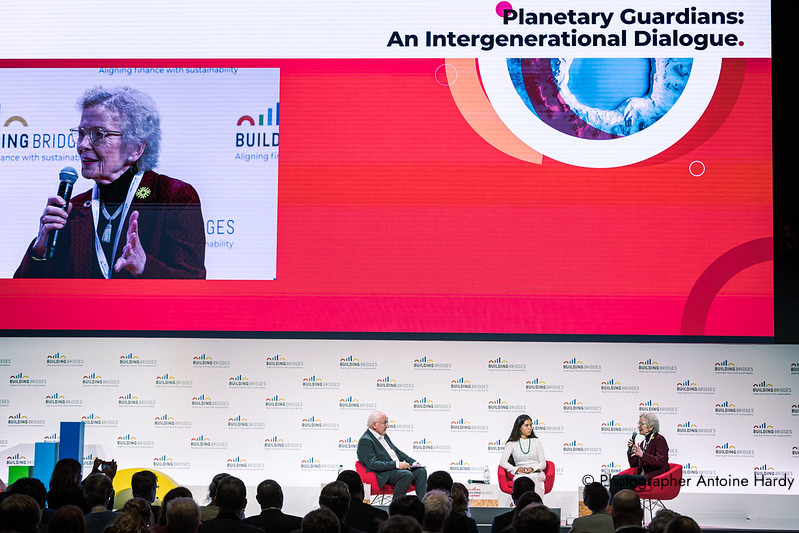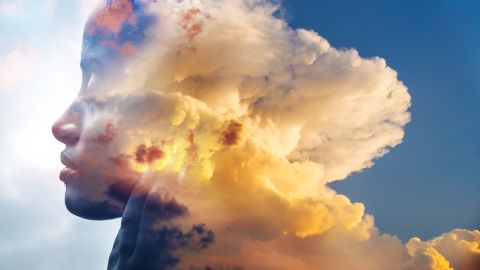Ideas from the Speakers
The session brought together two remarkable women from different generations to converse on the issue of climate change and intergenerational action. It exemplified the value of intergenerational collaboration in problem-solving at the global level.
Drawing on her extensive experience in human rights and climate justice, the first speaker focused on the importance of combining the wisdom of yesteryear with the creativity of tomorrow. She pointed out that, in a survey of 10.000 individuals, 77% believe true leadership must now be intergenerational (The Elders, 2024). She brought deep insight into the complex linkage between human rights and climate change, as well as the roles of successive generations.
The youth speaker brought fresh energy and a sense of urgency to the conversation. At just 21 years of age, she is already an important figure in the climate movement, having co-organized one of the largest youth-led climate marches in New York City. Her Indigenous background and experience in bringing together young people offered a unique perspective on the immediate consequences of climate change and the urgent need for action.
The session also explored the importance of inclusive decision-making that must include the voices of both older and younger generations. The older speaker shared her experience working with The Elders to foster intergenerational solidarity, while the younger speaker highlighted her work to empower frontline communities via the Re-Earth Initiative.
Both speakers agreed on the need to bridge the generational gap in climate action. They noted that older generations offer valuable insights from decades of environmental change, while younger generations bring innovative ideas and leverage digital platforms to drive mobilization.
The discussion also addressed climate justice. The speaker underscored that climate change is not only an environmental issue but also a human rights concern, disproportionately affecting vulnerable populations. Her counterpart described her experiences as an Indigenous activist and stressed the importance of placing frontline communities at the center of climate solutions.
The moderator asked about the challenges and opportunities in aligning finance with sustainability goals. The speakers discussed the need to mobilize capital at an unprecedented scale to build a just, resilient, and sustainable future, a central theme of the Building Bridges Summit.
The session ended with the call to action for both leaders and citizens. The speakers urged participants to commit to intergenerational approaches in their work, emphasizing that the climate crisis affects people of all ages and requires everyone’s involvement. Intergenerational dialogues can be a powerful motivator of mutual understanding, respect, and collaboration in addressing the climate crisis.
This session epitomized the objective of the Summit: to bring people together through expert-led discussions on pressing global issues. By bringing together voices from different generations, the dialogue demonstrated how combining experience with fresh perspectives can lead to innovative solutions.
In a world embattled by climate change and biodiversity loss, sessions like this underscore the importance of inclusive, intergenerational problem-solving.
Insights from the Audience
The session not only featured insightful discussions between the speakers but also engaged the audience.
One notable audience contribution came from a young South African entrepreneur and startup co-founder. His question focused on the concepts of “leave no one behind” and “nothing for us without us,” specifically asking about strategies to ensure young people from Africa are included in global financial and resource discussions that shape equitable sustainability. This question emphasized the need to further engage the Global South in conversations and, more importantly, decision-making processes.
Another audience member emphasized the importance of tapping into one’s inner activist, asking how individuals in the room could reach their full potential to accelerate change. This query underscored the Summit’s goal of inspiring action across all sectors of society.
A Villars Fellow addressed the challenge of shifting the narrative from eco-anxiety to eco-ambition. He asked what new or neglected skills, models, and mindsets youth entering the financial sector need, highlighting the necessity for clear direction in communicating complex ideas simply.
In conclusion, the Planetary Guardians session highlighted the power of intergenerational dialogue in driving climate action rooted in justice, inclusion, and shared responsibility. By bridging experience with innovation, the conversation reinforced that solving the climate crisis requires collaboration across ages, cultures, and sectors.







